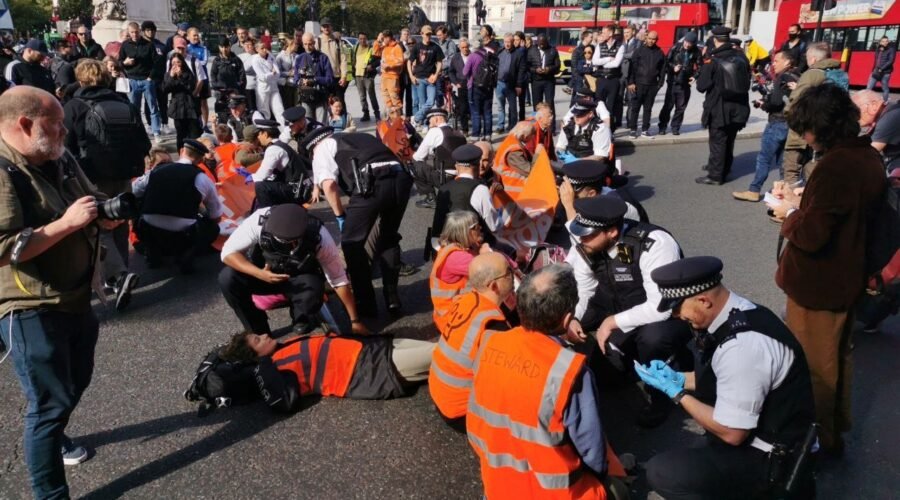Just Stop Oil has become one of the most talked-about climate activist groups in the United Kingdom. Founded in early 2022, the group quickly gained notoriety for its bold and disruptive protests. Their main demand is simple: the UK government must stop licensing new oil and gas projects. Members of Just Stop Oil have blocked roads, disrupted major events, and even targeted famous artworks to draw attention to the climate crisis.
The M25 Blockade and Historic Sentences
In November 2022, Just Stop Oil staged a major protest by blocking the M25 motorway, a critical route around London. The protest was meticulously planned, with activists climbing gantries and causing widespread traffic disruption. Authorities arrested and charged several members, including co-founder Roger Hallam, for conspiracy to cause public nuisance.
In July 2024, the court handed down record prison sentences. Hallam received five years, while four others—Daniel Shaw, Louise Lancaster, Lucia Whittaker De Abreu, and Cressida Gethin. Were sentenced to four years each. These are the longest sentences ever given in the UK for non-violent protest. The judge cited the careful planning and scale of the disruption as key factors in the sentencing.
Backlash and Appeals
The sentences sparked immediate backlash. Human rights groups, environmental organizations, and even United Nations officials called the punishments disproportionate. Amnesty International described the sentences as “draconian,” while a UN rapporteur called them “disproportionate” and a threat to the right to protest.
Public opinion also leaned against the harsh penalties. A poll found that 61 per cent of respondents thought the sentences were too severe, while only 12 per cent believed they were too lenient. Many experts warned that such punishments could set a dangerous precedent for peaceful protest in the UK.
In March 2025, the Court of Appeal reviewed the sentences. Roger Hallam’s term was reduced from five to four years. Other activists also saw their sentences shortened, but some appeals were dismissed. The court acknowledged the activists’ conscientious motives and referenced human rights protections for free expression and assembly.
The Changing Landscape for Protest
Just Stop Oil’s high-profile actions and the government’s response have changed the landscape for climate activism in the UK. New laws, such as the Public Order Act 2023, have imposed stricter penalties for disruptive protests. Police and courts now have more power to crack down on groups like Just Stop Oill.
The group has faced mounting challenges. Organizers say that increased surveillance and legal risks have made it almost impossible to operate as before. In April 2025, Just Stop Oil announced its final demonstration, claiming its main goal had been achieved after the government adopted a policy to stop new oil and gas licenses. Some members see this as a victory, while others argue that the crackdown has forced them underground.
Life Behind Bars for Activists
Reports have emerged about the treatment of Just Stop Oil activists in prison. Some members claim that prison officers have shown sympathy for their cause and even granted certain privileges. These accounts suggest a complex relationship between activists and authorities, with some guards expressing support for efforts to combat climate change. However, these claims remain anecdotal and have not been independently verified.
Despite these stories, the activists’ time in prison has been marked by restrictions. Many were denied the chance to explain their motives in court, and some faced additional penalties for protesting during their trials. The harsh sentences and prison experiences have become a rallying point for supporters, who argue that peaceful protest should not lead to years behind bars.
The Broader Impact of Just Stop Oil
The actions of Just Stop Oil have sparked a national and international debate about the right to protest, the urgency of climate action, and the limits of civil disobedience. While some criticize the group’s disruptive tactics, others believe their sacrifices have drawn much-needed attention to the climate crisis.
Environmental groups like Friends of the Earth and Greenpeace have supported appeals for reduced sentences, arguing that harsh punishments threaten democracy and human rights. The debate continues as the UK navigates the balance between public order and the right to demand urgent climate action.
Just Stop Oil remains a symbol of the new era of climate activism. Their story highlights the risks activists face and the power of protest to shape public policy and opinion.

